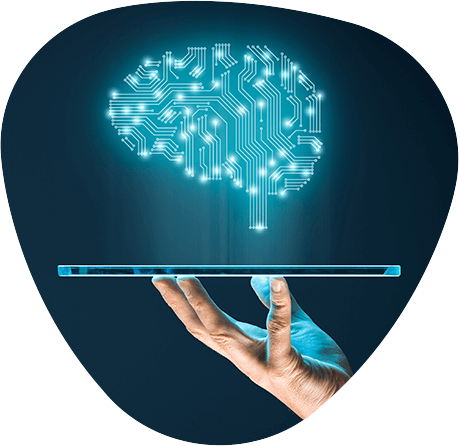to transform your data into actionable insights that can be pushed to your sales, marketing and decision-making teams with Help of Artificial Intelligence Company in Michigan.





We help businesses understand and identify opportunities to leverage AI technologies and provide guidance on implementing AI strategies, identifying use cases, and developing AI roadmaps.

We help AI service companies develop custom AI solutions tailored to meet specific business needs. This may involve building machine learning models, natural language processing algorithms, computer vision systems.

We offer expertise in data science and analytics, helping businesses extract insights from large and complex datasets. They employ statistical techniques, machine learning algorithms, and data visualization tools.

Assist businesses in integrating AI technologies into their existing systems and infrastructure.

Ai has made significant advancements in various fields, and one area where it has greatly impacted is content creation.

Build scalable, robust data infrastructures that enable you to store, process, and analyze large volumes of data with ease
Welcome to Metic.AI, your premier Artificial Intelligence Company in Michigan, where we leverage cutting-edge technology to transform the way businesses operate.
Artificial Intelligence (AI) is at the heart of our expertise, encompassing the development of computer systems capable of tasks that traditionally demand human intelligence. Artificial Intelligence Company in Michigan multidisciplinary approach spans machine learning, natural language processing, computer vision, robotics, and expert systems.
At Metic.AI, Artificial Intelligence Company in Michigan mission is to create intelligent machines that simulate human thought processes and behavior. These machines, driven by AI, learn from experience, adapt to new situations, and execute tasks autonomously. Leveraging vast datasets, our AI systems analyze information, identify patterns, and make informed decisions or predictions.
A vital aspect of our AI prowess is machine learning, where we design algorithms to learn from data without explicit programming. This enables our models to recognize intricate patterns and deliver precise predictions or classifications.
Explore the limitless possibilities of AI with Metic.AI – your trusted Artificial Intelligence Company in Michigan.
Machine Learning is a subfield of AI that focuses on enabling computers to learn and improve from experience without being explicitly programmed. It involves the development of algorithms and models that can automatically learn and make predictions or decisions based on data. Machine Learning algorithms can be supervised, unsupervised, or semi-supervised, depending on the availability of labeled data.
Natural Language Processing (NLP) deals with the interaction between computers and human language. It enables computers to understand, interpret, and generate human language in a way that is meaningful and useful. NLP plays a crucial role in applications such as voice assistants, chatbots, and language translation.
Computer Vision involves enabling computers to understand and interpret visual information from images or videos. It encompasses tasks such as object recognition, image classification, and facial recognition. Computer Vision is used in various domains, including autonomous vehicles, surveillance systems, and medical imaging.
Robotics combines AI with mechanical engineering to design and develop robots that can perform tasks autonomously or with minimal human intervention. Robots equipped with AI capabilities can perform complex tasks in manufacturing, healthcare, exploration, and many other industries. They can adapt to changing environments, learn from their surroundings, and interact with humans in a safe and intelligent manner.
Deep Learning is a subset of Machine Learning that focuses on training artificial neural networks with multiple layers to learn and make decisions. These neural networks, also known as deep neural networks, are inspired by the structure and function of the human brain. Deep Learning has achieved remarkable success in various domains, including image recognition, speech recognition, and natural language understanding.
Predictive Analytics utilizes AI techniques to analyze historical data and make predictions or forecasts about future events or trends. By identifying patterns and relationships in the data, predictive analytics algorithms can provide valuable insights and assist in decision-making. Industries such as finance, marketing, and healthcare leverage predictive analytics to optimize operations and improve outcomes.
One of the key features of AI is its ability to automate tasks that were traditionally performed by humans. AI-powered automation can significantly improve efficiency, productivity, and accuracy in various domains. From automated customer support systems to intelligent data analysis, AI-driven automation is transforming the way businesses operate.
AI enables personalized experiences by analyzing user data and preferences. Personalization algorithms can recommend products, services, or content tailored to individual users, enhancing customer satisfaction and engagement. Personalized recommendations are widely used in e-commerce, streaming platforms, and online advertising.
AI systems can process large volumes of data, identify patterns, and make informed decisions or solve complex problems. By leveraging advanced algorithms and computational power, AI can provide valuable insights and recommendations to support decision-making processes. AI-powered decision-making is particularly valuable in domains such as finance, healthcare, and logistics.

Introduction In today’s rapidly evolving technological landscape, the utilization of
AI migration, the process of adopting and integrating artificial intelligence
Generative AI: Unleashing Creativity with Artificial Intelligence Generative AI, also
AI systems learn from data by using algorithms and mathematical models that analyze patterns and relationships within the data. These models are trained on labeled or unlabeled data to make predictions or decisions.
AI has the potential to automate certain tasks and jobs. While this may result in job displacement in some areas, it also creates opportunities for new roles and industries to emerge.
AI can be biased if the training data used to develop AI models contains biases. It is important to address bias in AI systems to ensure fair and equitable outcomes.
Ethical concerns in AI include privacy, transparency, bias, accountability, and the impact on jobs and society. It is crucial to consider these concerns and develop AI systems responsibly.
AI is expected to have a significant impact on various industries, improving efficiency, personalization, and decision-making. It will continue to drive innovation and shape the way we live and work.
In the rapidly evolving landscape of technology, Artificial Intelligence (AI) has emerged as a transformative force, impacting industries across the globe. Michigan, USA, known for its historical contributions to the automotive industry, is now positioning itself at the forefront of AI innovation. The state is home to a growing number of Artificial Intelligence Company in Michigan that are driving advancements in various sectors.
Automotive AI Integration
Healthcare Revolution
Smart Manufacturing
Fintech Advancements
Education and Research
Government Initiatives
Certainly! Automotive AI integration refers to the incorporation of Artificial Intelligence (AI) technologies and algorithms into various aspects of the automotive industry. This integration is aimed at enhancing the performance, safety, efficiency, and overall intelligence of vehicles and related systems. Automotive AI integration encompasses a wide range of applications, transforming the way vehicles are designed, manufactured, operated, and maintained. Here are some key aspects of Automotive AI Integration:
Autonomous Driving: One of the most notable applications of AI in the automotive industry is in the development of autonomous or self-driving vehicles. AI algorithms, including machine learning and computer vision, are used to analyze real-time data from sensors such as cameras, radar, and lidar. This enables vehicles to perceive their environment, make decisions, and navigate without human intervention with help of Artificial Intelligence Company in Michigan.
Advanced Driver Assistance Systems (ADAS): ADAS incorporates AI technologies to assist drivers in various aspects of vehicle operation. Features such as adaptive cruise control, lane-keeping assistance, automatic emergency braking, and parking assistance rely on AI algorithms to interpret data from sensors and make real-time decisions to enhance safety and convenience.
Predictive Maintenance: AI is utilized to predict and prevent potential issues with vehicle components before they lead to breakdowns. By analyzing data from sensors that monitor the condition of various parts, AI algorithms can predict when maintenance is needed, helping to reduce downtime and extend the lifespan of vehicle components.
Connected Vehicles: AI plays a crucial role in enabling vehicles to communicate with each other and with the infrastructure. This facilitates the exchange of information about road conditions, traffic, and potential hazards. AI algorithms process this data to optimize routes, improve traffic flow, and enhance overall transportation efficiency.
Vehicle Design and Manufacturing: AI is applied in the design and manufacturing processes to improve efficiency and quality. Generative design, a form of AI-assisted design, helps engineers create optimal vehicle structures, considering factors such as weight, strength, and aerodynamics. In manufacturing, AI is used for quality control, defect detection, and process optimization.
Natural Language Processing (NLP) in Human-Machine Interaction: AI-powered voice recognition and natural language processing systems are integrated into vehicles, allowing drivers to interact with their cars using voice commands. This includes controlling entertainment systems, navigation, climate control, and other features, providing a more intuitive and hands-free driving experience.
Traffic Management and Navigation: AI is applied to analyze traffic patterns, predict congestion, and optimize navigation routes in real-time. This not only improves individual driving experiences but also contributes to overall traffic flow and reduces environmental impact by minimizing fuel consumption and emissions.
Automotive AI integration is a dynamic field that continues to evolve with advancements in AI technologies. The goal is to create safer, more efficient, and intelligent vehicles that can adapt to the complexities of the modern transportation landscape. As AI technologies mature, we can expect further innovations in the automotive industry, transforming the way we perceive and interact with vehicles.
